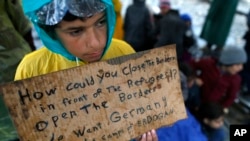As migrant arrivals to Germany slow to a trickle, a registration center on the border with Austria stands almost deserted, with rows of beds unused and rooms for fingerprinting refugee arrivals empty.
At the shelter in Freilassing, which registered up to 2,000 people a day at peak times last September, barely a handful of migrants arrived Wednesday night. The center's dining halls and sleeping quarters looked like they were from a ghost town.
"[After last summer's peak], we had around 1,200 refugees per day and this went on until ... the Balkan route was closed," said Josef Flatscher, the mayor of Freilassing, a town across the border from Austria's Salzburg.
"Since then, the numbers dropped drastically, one can say to close to zero. Tonight, only three people arrived," he told Reuters TV.
Just over 108,000 migrants have entered Germany so far this year, a federal police spokesman told Reuters on Wednesday.
Domino effect
The number of arrivals has dropped significantly in recent weeks, however. Back in January, police registered around 64,700 migrants, but only about 5,300 people crossed into Germany in the first 29 days of March.
In late February, Austria introduced daily caps on the number of migrants, setting off a domino effect across southeastern Europe, where countries along Europe's main migrant route sealed their borders.
Migrants, many of whom are fleeing war and conflict in the Middle East and beyond, are now stranded in Greece after crossing the Mediterranean from Turkey.
In Freilassing, the slowdown is a welcome break, giving much strained police forces, officials and volunteers "room to breathe," Flatscher said.
He doesn't believe the calm will last, however.
"You can simply add one and one together if you know the people's conditions everywhere down there, and that they are obviously waiting to get away into a so-called 'Promised Land', such as Germany," he said.













